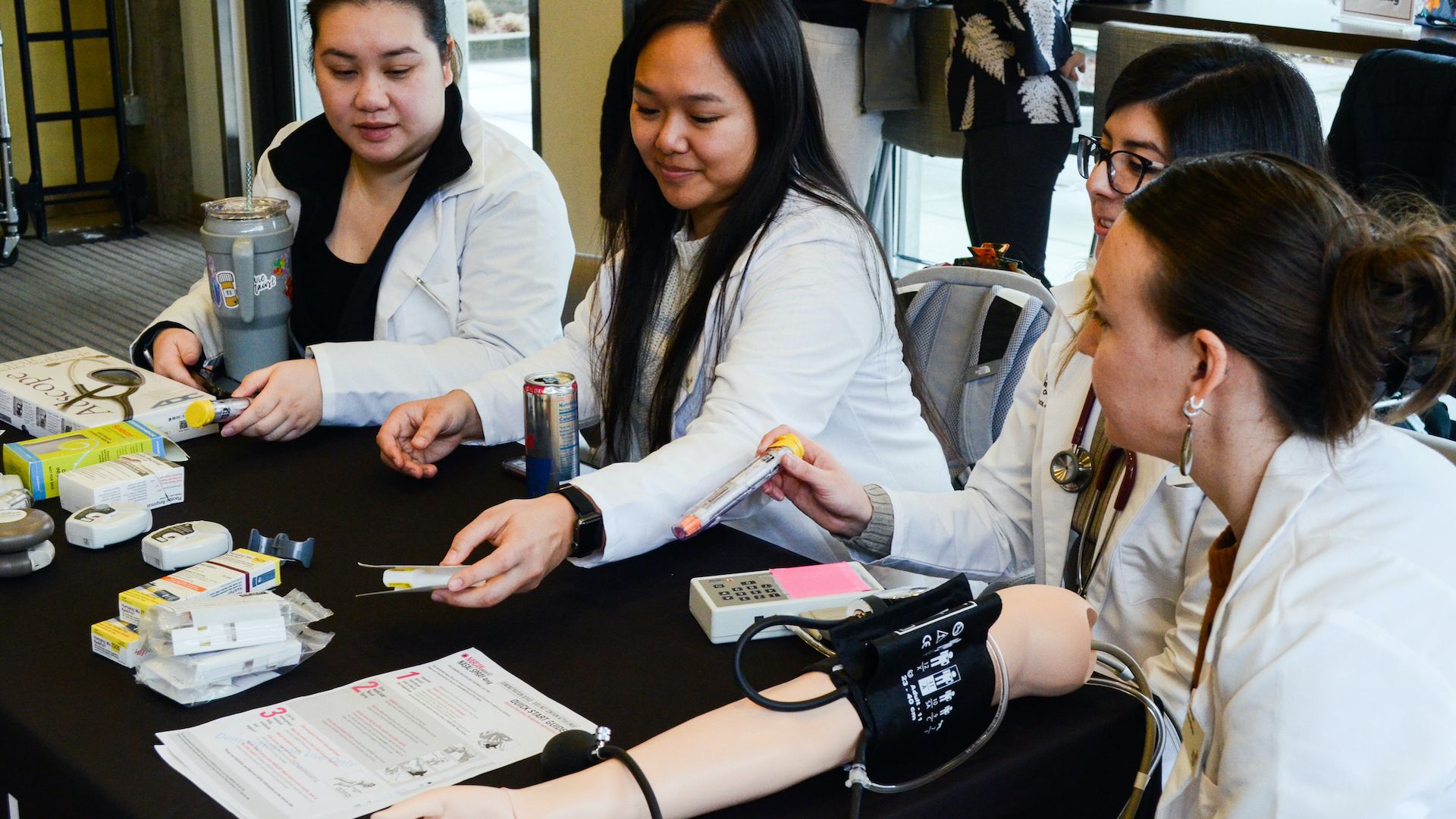A PharmD student's final year is devoted entirely to on-site Advanced Pharmacy Practice Experiences (APPEs). Students complete four required APPEs (Advanced Community, Health System, Ambulatory Care, and Internal General Medicine). They are also required to complete three elective APPEs, at least one of which must be in an area focused on direct patient-care.
APPE Block Dates for 2025-2026 Academic Year
| Start Date | End Date | |
|---|---|---|
| Block 1 | 5/12/25 | 6/20/25 |
| Block 2 | 6/23/25 | 8/01/25 |
| Block 3 | 8/04/25 | 9/12/25 |
| Block 4 | 9/15/25 | 10/24/25 |
| Block 5 | 10/27/25 | 12/05/25 |
| Block 6 | 12/29/25 | 2/06/26 |
| Block 7 | 2/9/26 | 3/20/26 |
| Block 8 | 3/23/26 | 5/01/26 |
Required APPEs
- Advanced Community
- Emphasis will be placed on the student’s ability to demonstrate their understanding of common disease states and treatment modalities as well as their ability to provide pharmaceutical care. Emphasis will also be placed on disease state management initiatives.
- Health System
- Students will participate in a variety of clinical activities, functioning as an integral member of the healthcare team. Emphasis will be placed on the student’s ability to demonstrate their understanding of functional roles of health system pharmacy in providing
consistent quality patient care.
- Students will participate in a variety of clinical activities, functioning as an integral member of the healthcare team. Emphasis will be placed on the student’s ability to demonstrate their understanding of functional roles of health system pharmacy in providing
- Internal General Medicine
- Students will gain professional skills in an Internal General Medicine setting and will effectively participate in the patient care decision-making process. Students will participate in a variety of clinical activities, functioning as an integral member of the healthcare team.
- Ambulatory Care
- Students will participate in a variety of clinical activities, functioning as an integral member of the healthcare team. Emphasis will be placed on the student’s ability to demonstrate their understanding of common disease states and treatment modalities as well as their ability to provide pharmaceutical care.
Elective APPEs
- Direct Patient Care Elective
- This elective may occur in any setting where the student provides direct pharmaceutical care to patients. Examples of Patient Care electives include: Advanced Community, Cardiology, Critical Care, Oncology, Home Infusion, Infectious Disease, Long Term Care, Nutrition, Pediatrics, and Trauma Surgery.
- Patient or Non-Patient Care Electives (2)
- Students choose two patient or non-patient care electives. Examples of non-patient care electives include: Academia, Compounding, Drug Information, Managed Care, Pharmaceutical Industry, and Research. Elective rotations can also encompass any Advanced Community, Ambulatory Care, Internal Medicine, or Health System Rotation.
- Self-Study or Additional Elective
- Students have one of three options:
- Self-Study: Review for NAPLEX/MPJE
- International Experience
- Additional Patient/Non-Patient Care Elective
APPE Rotation Learning Objectives
The learning objectives for this APPE are based on Curricular Outcome and Entrustable Professional Activities developed in association with the Northwest Pharmacy Experiential Consortium (APPE 2024 Revision). The pharmacy intern will:
- Collect: Collect relevant information to understand a patient's medical/medication history, clinical status, and health/medication-related needs.
- Assess: Analyze information to determine the effects of medication therapy, identify medication-related needs, and prioritize health-related needs in the context of the patient's health goals.
- Plan: Establish patient-centered goals and create a care plan for a patient in collaboration with the patient, caregiver(s), and other health professionals that is evidence-based and cost-effective
- Implement: Implement a care plan in collaboration with the patient, caregivers, and other health professionals
- Follow-up, Monitor, and modify: Follow up, monitor, and modify a previously developed care plan as appropriate.
- Information Expertise: Apply evidence-based medicine practices to provide clinically relevant patient care
- Health Promoter: Assess factors that influence health and wellness and develop strategies to address those factors.
- Operations: Ability to integrate within daily operations and workflow of the site.
- Safety/Quality Improvement: Apply continuous improvement techniques to improve safety and quality.
- Team Interactions: Acts as a collaborative team member.
- Communication: Effectively Communicates Information verbally, non-verbally, and in written form when interacting with an individual, group, or organization
- Self-awareness: Responsible for self-awareness and ongoing personal and professional development and demonstrates commitment to development of others.
- Accountability and trust: Demonstrate actions congruent with qualities that foster accountability and trust
- Demonstrates learning: Develops, integrates, and applies knowledge and skills appropriately to situations encountered in the practice setting.
- Demonstrating Critical Thinking during the Problem-Solving Process. Critical thinking is an intellectually disciplined process of skillfully evaluating information and designing a creative solution that incorporates new ideas or methods, when appropriate.
